In the complex interplay of international relations, South Korea finds itself at a pivotal juncture as the Trump administration embarks on its second term. Choi Sang-mok, the acting president and finance minister, has expressed optimism about fostering a more reciprocal relationship with the United States. His emphasis on strengthening policy cooperation with U.S. authorities underscores the importance of the bilateral alliance, especially amid rising uncertainties stemming from evolving U.S. policies that could have significant implications for South Korea’s robust economy.
As a nation with deep-rooted ties to the U.S., South Korea is poised to navigate a myriad of challenges while capitalizing on potential opportunities. Choi’s assertion regarding the need for close cooperation aligns seamlessly with the longstanding slogan of the Korea-U.S. alliance, “We Go Together.” This expression not only reflects the historical camaraderie between the two nations but also serves as a call for collaboration at a time when diplomatic tensions could escalate.
The turbulence of South Korea’s domestic political climate has left the nation vulnerable on the international stage, particularly as it seeks to engage with global powers like the United States. Choi has publicly announced his intention to connect with President Trump as soon as possible, reflecting a proactive approach to diplomacy. The lack of communication between the new U.S. administration and South Korea’s leadership, especially following recent political upheavals, raises questions about the effectiveness of South Korea’s current diplomatic maneuvers.
The political crises that led to the impeachment of both Prime Minister Han Duck-soo and President Yoon Suk Yeol have inevitably weakened South Korea’s position. Unlike other countries such as China and Japan, which have dispatched high-ranking officials to cultivate diplomatic relationships with the U.S., South Korea’s inability to secure reciprocal engagement signals a potential disadvantage. Analysts, including Leif-Eric Easley from Ewha University, observe that this precarious diplomatic standing could yield unfavorable outcomes in negotiations that may follow.
Trade dynamics are particularly crucial as the U.S. administration explores measures that could substantially affect South Korea’s economy. Choi’s announcement to review responses to Trump’s proposed trade policies—especially concerning tariffs and electric vehicle regulations—highlights apprehension over the prospects of new tariffs. In 2024, South Korea experienced a record trade surplus with the U.S., amounting to $55.7 billion, leading to speculation that the Trump administration may consider trade restrictions as part of its broader economic strategy.
The potential for punitive tariffs not only raises concerns among policymakers but also resonates across South Korean industries. The stock market’s reaction to Trump’s tariff warnings illustrates this anxiety; the benchmark KOSPI index quickly reversed gains following threats of a 25% tariff on imports from neighboring countries, where many South Korean enterprises maintain a presence. Additionally, this atmosphere of uncertainty has negatively impacted shares of South Korean companies involved in the electric vehicle sector, accentuating the direct stakes involved in U.S. policy shifts.
In light of these challenges, South Korea’s approach should emphasize strategic adaptability. The country’s defense cost-sharing arrangement for the U.S. troops stationed in South Korea, amidst ongoing tensions with North Korea, remains a delicate issue. The Trump administration’s continued insistence on increased payments could complicate security arrangements, forcing South Korea to strike a balance between maintaining its defense and managing its economic interests.
Moreover, the outlook for sectors that align with the Trump administration’s agenda, such as shipbuilding, may provide avenues for cooperation. However, as South Korea navigates this evolving landscape, it must ensure that its diplomatic efforts are not overshadowed by domestic political instability. Unity in leadership and a concerted strategy are imperative if South Korea is to solidify its standing in a world increasingly influenced by unilateral U.S. policy decisions.
South Korea stands at a crossroads as it engages with the Trump administration’s policies while managing its own internal political complexities. A proactive, unified approach will be essential in effectively addressing the challenges on the horizon while safeguarding the nation’s economic stability and security alliances.

